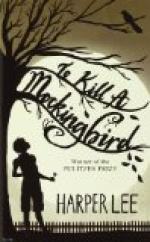|
This section contains 1,583 words (approx. 4 pages at 400 words per page) |

|
Felty is a visiting instructor at the College of Charleston. In the following essay, he explores how the narrative structure of To Kill a Mockingbird supports a reading of the novel as a protest against prejudice and racism.
Most critics characterize Harper Lee's To Kill a Mockingbird as a novel of initiation and an indictment of racism. The novel's point of view, in particular, lends credence to these readings. As an older woman, Jean Louise "Scout" Finch, the narrator, reflects on three crucial summers in her childhood. During this time, she, her brother Jem, and their friend Dill encounter two figures who change their views of themselves and their community. The first of these people, Boo Radley, the Finches' reclusive neighbor, develops from a "malevolent phantom" who dominates the children's imaginations to a misunderstood man who saves Scout's and Jem's lives. Tom Robinson, the second and more...
|
This section contains 1,583 words (approx. 4 pages at 400 words per page) |

|




